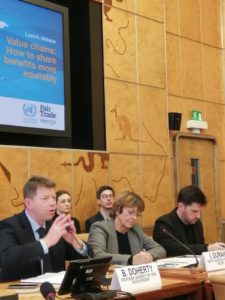UNCTAD and Fair Trade movement host event to discuss how to share benefits more equitably in value chains
Today, the 22 January 2020, the United Nations Conference on Trade and Development (UNCTAD) in collaboration with the Fair Trade Advocacy Office, hosted a debate with the title “Value chains: How to share benefits more equitably” at the UNCTAD Headquarters, the United Nations Office in Geneva. This event takes place as follow-up to the framework of cooperation signed in October 2018 between UNCTAD and the Fair Trade Advocacy Office, a joint initiative of Fairtrade International and the World Fair Trade Organization.
 The event was chaired by Isabelle Durant, Deputy Secretary General of UNCTAD. It was attended by numerous government officials, intergovernmental and non-governmental organisations. It offered an opportunity to present to the different and complementary strategies of the Fair Trade movement in making global value chains more sustainable, inclusive and equitable.
The event was chaired by Isabelle Durant, Deputy Secretary General of UNCTAD. It was attended by numerous government officials, intergovernmental and non-governmental organisations. It offered an opportunity to present to the different and complementary strategies of the Fair Trade movement in making global value chains more sustainable, inclusive and equitable.
The event was an opportunity for the World Fair Trade Organization (WFTO) to present its new report “New business models to put people and planet first”. Bob Doherty, York University professor and the author of the report, gave a presentation on its main findings. Read the WFTO report on “New business models to put people and planet first” here.
“The new economy is already here. Fair Trade Enterprises are joining forces with the broader social enterprise movement and others to demonstrate that business can truly put people and planet first. We all need to embrace this revolution in business,” said Roopa Mehta, the president of WFTO.
The event was also an opportunity to present the work of the Fairtrade system with governments, international bodies and other civil society organisations to advance decent living for farmers and workers. This includes campaigning for living incomes for cocoa and coffee producers and living wages for banana and flower agricultural workers; tackling child and forced labour in the sugar and cocoa sector; and working with regional bodies to strengthen sustainable south-to-south trade through harmonised trade standards.
“At the end of the day, small-scale producers need to earn a living income or living wage, and support their families and communities. It’s not only fair – it’s also essential to the future of products like coffee and chocolate. It will take all of us working together to make supply chains more sustainable – economically, socially and environmentally,” said Dario Soto Abril, CEO of Fairtrade International.